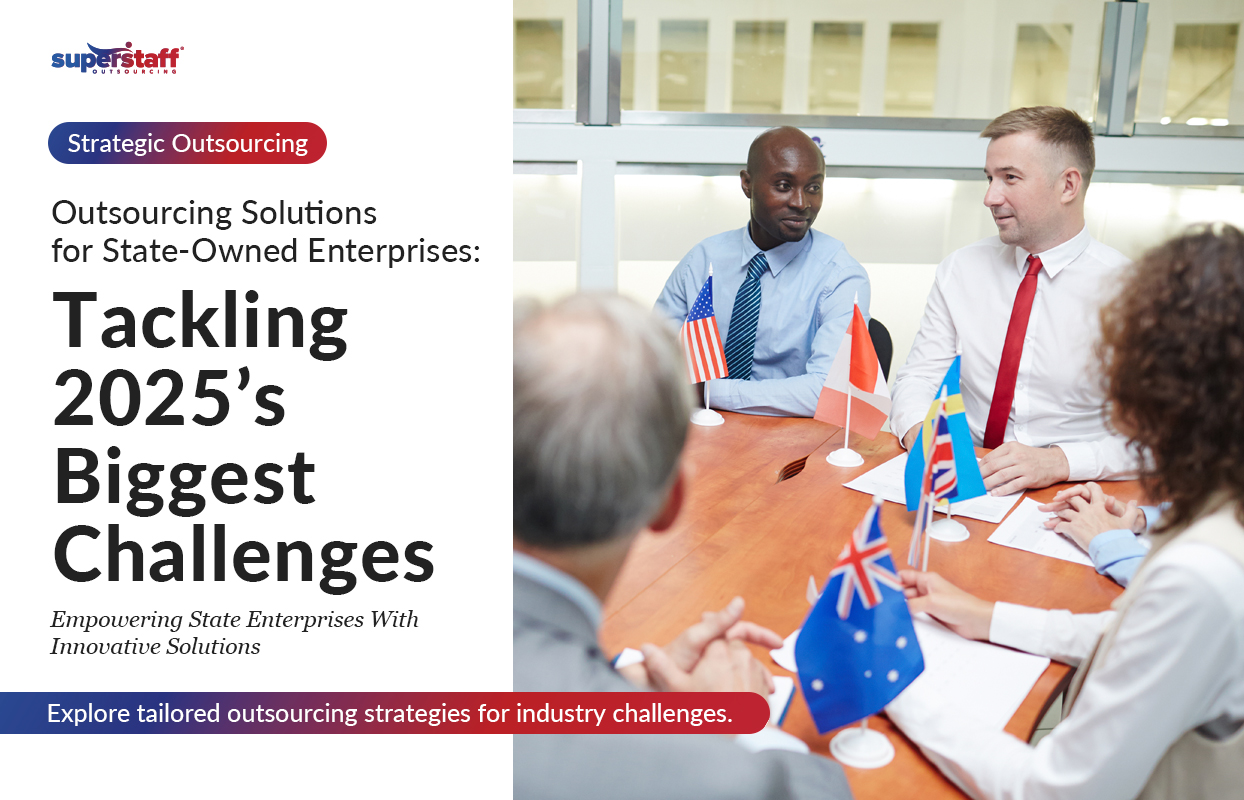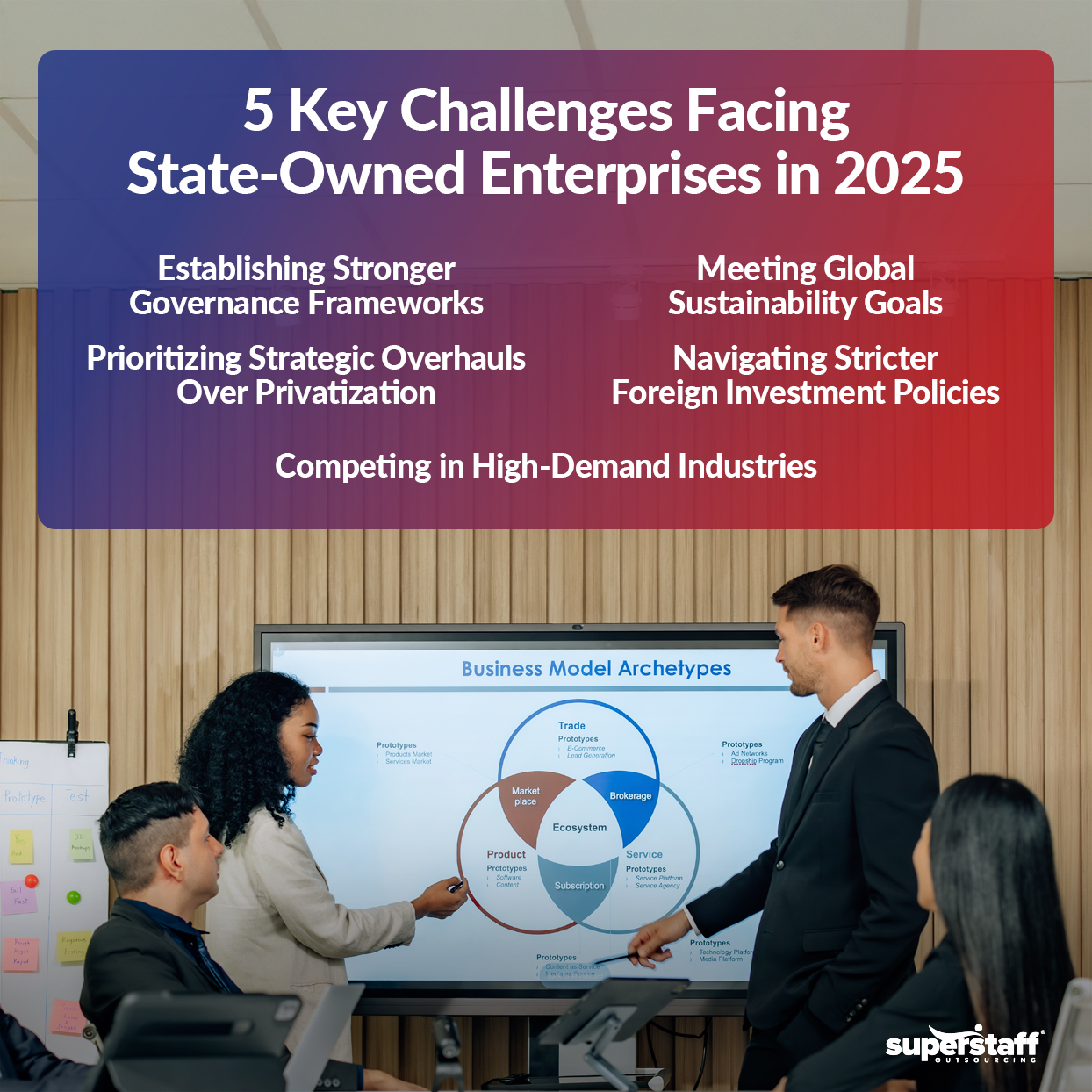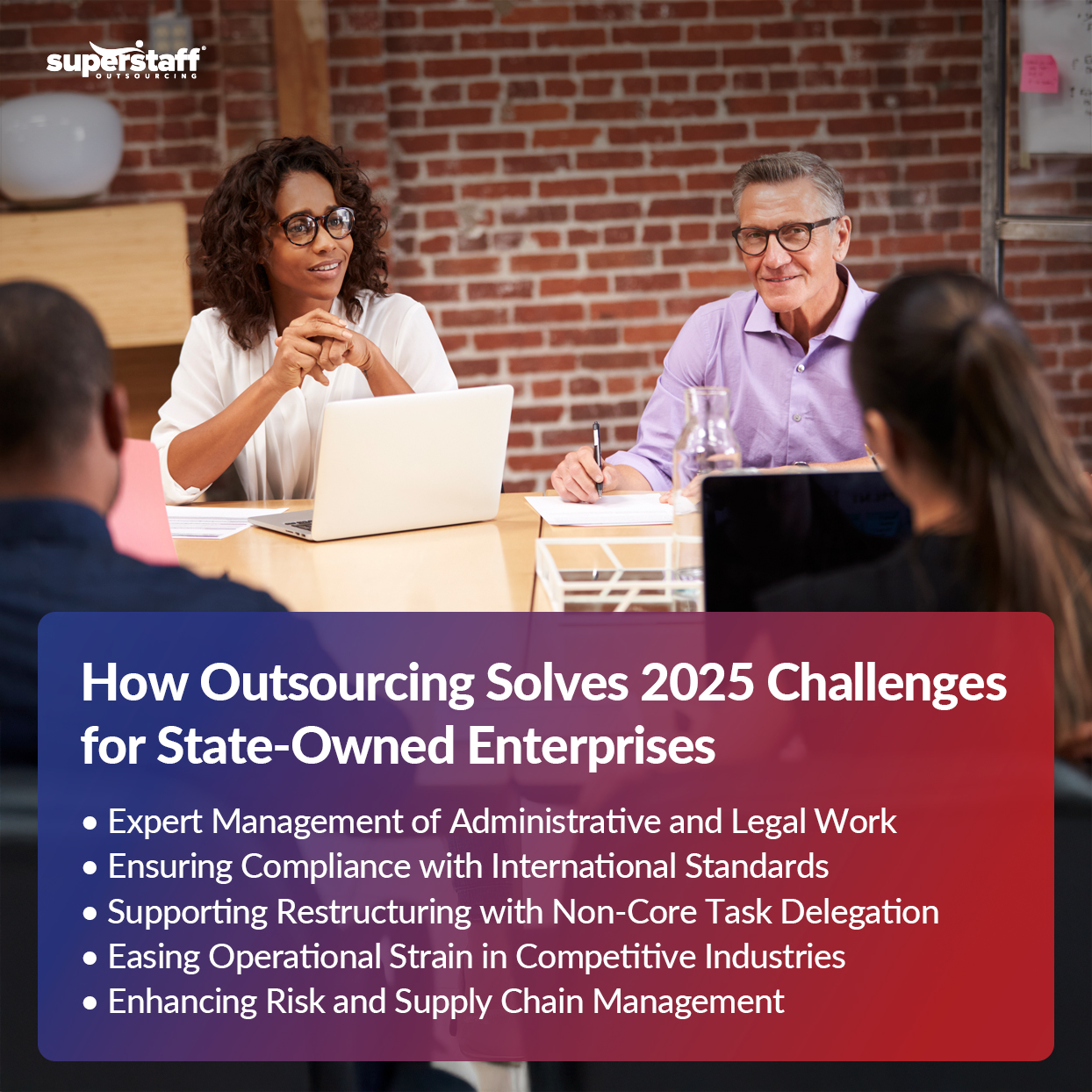
As the new year approaches, state owned enterprises (SOEs) face a landscape of mounting challenges that demand strategic foresight and adaptability.
US state owned enterprises are evolving rapidly, with leaders grappling with a range of pressures. Managing these hurdles while ensuring consistent performance in core operations can be both overwhelming and resource-intensive. The complexity of balancing governance demands, sustainability goals, and global competition often requires more than traditional approaches. Fortunately, outsourcing offers a practical and effective solution to navigate these challenges.
In this article, we will unpack the most significant challenges SOEs will encounter in 2025, including stricter governance frameworks, shifting priorities toward performance over privatization, heightened sustainability expectations, and navigating foreign investments. Along the way, we’ll explore how outsourcing can be a transformative strategy for addressing these issues.
Outsourcing helps streamline operations and provides a cost-effective way to meet new demands without compromising productivity. By understanding these upcoming challenges, you can take the first step in crafting a strategic plan that positions your organization for success. Let’s dive in.

Enhanced Governance and Transparency for State Owned Enterprises
Governments increasingly prioritize stricter governance frameworks to improve the performance, accountability, and responsibilities of state owned enterprises (SOEs). These evolving standards present significant challenges for SOEs striving to align with global expectations.
Key Governance Challenges for SOEs:
- Equal Footing with Non-SOEs:
SOEs are expected to meet the same operational and regulatory standards as non-state enterprises. While they receive unique benefits, such as preferential tax treatments and exemptions from reporting contract-related contingencies in 38% of jurisdictions (according to the OECD), these advantages often create complexities, including:- Difficulty in assessing financial risks.
- Increased pressure on non-SOEs to adjust to these benefits.
- Enhanced Legal Frameworks:
Governments and organizations like the OECD emphasize the importance of:- Strengthening accountability and transparency measures.
- Defining clear roles and responsibilities for SOE boards.
- Enforcing policies that uphold transparency and proactive state ownership globally.
The Core Challenge
Balancing stricter governance requirements with the need to maintain streamlined, high-quality operations is no small feat. As policies shift, SOEs must:
- Adapt to changing regulations while meeting performance expectations.
- Manage the strain of compliance without compromising their primary operations.
Why Outsourcing Is the Solution
Outsourcing provides a strategic and effective way to address these governance challenges. By leveraging specialized third-party teams, SOEs can:
- Ensure Compliance: Outsourced experts understand international standards and provide unbiased, transparent reporting.
- Streamline Operations: Administrative and legal tasks can be handled more efficiently, freeing internal teams to focus on core objectives.
- Achieve Cost Efficiency: Outsourcing reduces overhead costs while maintaining high-quality outcomes.
From meeting government benchmarks to staying current with compliance policies, outsourcing allows SOEs to navigate governance challenges without sacrificing operational excellence or financial stability.
As governments establish these frameworks, they also focus on strategic restructuring and boosting SOE performance. Let’s explore this next.
Prioritizing Strategic Overhauls Over Privatization for your State-Owned Enterprise
Countries worldwide are moving away from privatization and prioritizing restructuring to enhance the profitability of state-owned enterprises (SOEs). This strategic shift aims to strengthen performance without relinquishing government ownership, signaling a new approach to boosting efficiency and long-term viability.
What Is Privatization?
Privatization involves transferring government-owned properties or enterprises to private entities. While privatization can provide immediate cost savings for governments and grant complete control to private owners, it often means relinquishing long-term control and influence over critical industries.
A Global Example: India’s Restructuring Model
India offers a compelling example of this shift. According to Reuters, the country plans to revamp over 200 state-owned firms, moving away from privatization in favor of restructuring to drive profitability. Key initiatives include:
- Performance Goals: Establishing 5-year targets instead of focusing on short-term results.
- Revenue Objectives: To generate $24 billion within the fiscal year through better resource allocation and restructuring efforts.
- Investment Optimization: Reassessing where funds are invested to maximize returns.
Implications for SOE Leaders
For SOE leaders, restructuring means rethinking operational strategies and significantly adjusting internal processes. This often involves:
- Shifting Focus to Core Operations: Restructuring emphasizes directing resources to strategic goals while delegating non-core yet essential functions.
- Adopting Digital and Technological Solutions: Technological upgrades are critical for staying competitive and streamlining workflows.
How Outsourcing Supports Restructuring
Outsourcing provides a strategic advantage during restructuring by enabling SOEs to:
- Offload Non-Core Tasks: Functions like human resources, IT support, finance, and bookkeeping can be managed by specialized outsourced teams.
- Maintain Continuity: During transitions, outsourcing ensures critical functions operate smoothly.
- Enhance Efficiency: Outsourcing allows SOEs to focus on long-term goals while meeting immediate operational needs.
As governments prioritize restructuring over privatization, SOEs must adapt to increasingly competitive sectors. Let’s explore how these industries shape the future of state-owned enterprises.
Focus on Competitive Sectors
State owned enterprises (SOEs) are increasingly operating in demanding, fast-paced, and highly competitive markets. Key sectors like tourism and manufacturing highlight this trend. According to the World Bank Group, approximately 70% of SOEs function within these high-demand industries, where private enterprises often excel in efficiency and productivity. The implication is clear: SOEs must rise to meet the intense demands of these competitive environments.
Customer Expectations in Essential Industries
SOEs delivering essential services must deeply understand the needs of their customers. In industries like tourism and logistics, customer experiences are often defined by efficiency and speed. These expectations are high, and any lapse in service delivery can erode trust and drive customers to seek alternatives.
Challenges of Global Competitiveness
The OECD reports that 22% of the world’s largest firms are state-owned, marking the highest level of state ownership globally. While this dominance provides strategic advantages, it also raises two key challenges:
- Concerns Over Competitive Advantage: The benefits of state ownership, such as favorable policies, can create an uneven playing field.
- Adjustment to Global Demands: SOEs must operate globally, requiring rapid adaptation to shifting market dynamics.
The Role of Outsourcing in Competitive Markets
SOEs face significant pressure to deliver efficient, high-quality, and cost-effective operations, often outside their core areas of expertise. Partnering with outsourcing providers offers strategic solutions to these challenges:
- Streamlined Expertise: Outsourcing ensures non-core functions, such as customer experience management, logistics, and back office outsourcing services, are handled by skilled professionals.
- Agility and Adaptability: Outsourced teams enable SOEs to adapt to industry shifts quickly, ensuring seamless service delivery.
- Customer-Centric Operations: Outsourcing safeguards customer satisfaction and loyalty by enhancing service efficiency, preventing delays that could negatively impact experiences.
Preparing for Sustainability Challenges
As SOEs establish their presence in competitive markets, they must also address the growing importance of environmental and sustainability considerations. Let’s explore how these factors are shaping the future of state-owned enterprises.
Integration of Environmental Objectives
Global sustainability goals are becoming a central focus for businesses worldwide, and as an SOE leader, you recognize the importance of aligning your operations with these expectations. Today’s consumers prioritize brands that actively commit to sustainable practices, rewarding them with loyalty and ongoing support.
A Case Study: China’s Green Initiative
China’s green initiative offers a compelling example of a country taking decisive action toward sustainability. As the largest greenhouse gas emitter, accounting for approximately one-third of global emissions, China has embraced environmentally friendly strategies, particularly in finance.
- Massive Investments: China has issued over $300 billion in green market bonds to fund its sustainability projects, underscoring the financial commitment required to drive meaningful change.
- Key Challenges: While the initiative sets a benchmark for eco-conscious practices, the high costs and complexities present significant hurdles for state-led enterprises.
What Sustainability Goals Mean for SOEs
For SOEs, integrating global sustainability goals is not just a moral imperative but a strategic one. However, achieving these goals requires:
- Significant Financial Investments: Meeting sustainability benchmarks often demands extensive resources.
- Operational Alignment: Balancing eco-friendly initiatives with day-to-day operations can overwhelm internal teams.
The Role of Outsourcing in Sustainability
Outsourcing offers a viable solution for SOEs striving to meet sustainability objectives while managing operational challenges:
- Streamlining Eco-Friendly Initiatives: Specialized outsourcing providers bring expertise in corporate social responsibility (CSR) and supply chain management, simplifying the execution of large-scale sustainability projects.
- Cost-Effective Resource Allocation: By delegating eco-focused tasks, SOEs can focus their internal resources on core functions without compromising sustainability commitments.
- Global Expertise: Outsourcing partners experienced in managing international environmental projects can help SOEs align with global standards, ensuring seamless integration of sustainability practices.
As SOEs take bold steps toward sustainability, another pressing challenge emerges: protecting national interests and resources. Let’s explore how governments address this next.
Increased Scrutiny of Foreign Investments
Governments worldwide are implementing stricter restrictions and regulations on foreign investments to protect national interests and maintain policy integrity. This shift underscores the need for state-owned enterprises (SOEs) to adapt and align their strategies with evolving governance landscapes.
A Case Study: The EU’s Approach to Chinese Investments
The European Union offers a clear example of this trend. According to Reuters, the EU has introduced additional tariffs on China’s electric vehicles (EVs) as part of anti-dumping and anti-subsidy investigations. These measures aim to ensure fair competition while supporting SOEs impacted by these investments, regardless of the extent of Chinese government ownership.
Challenges of Foreign Investments for SOEs
Managing foreign investments has unique challenges, especially as governments intensify regulatory oversight. Key considerations include:
- Risk Management: Stricter regulations demand enhanced risk assessment and compliance capabilities.
- Resource Strain: Balancing national interests with the complexities of foreign investments can overwhelm internal teams.
- Economic Variables: Currency fluctuations and exchange rate volatility introduce additional layers of complexity to international ventures.
Outsourcing as a Strategic Solution
Outsourcing providers specializing in risk management and compliance offer SOEs the tools and expertise needed to navigate foreign investment challenges effectively:
- Streamlined Risk Management: Experienced outsourcing teams assess potential risks, ensuring compliance with international regulations and safeguarding enterprise investments.
- Expert Financial Oversight: Outsourced financial analysts monitor economic variables, such as currency fluctuations, to help SOEs make informed decisions and mitigate financial risks.
- Operational Focus: By delegating risk and compliance tasks to experts, SOEs can redirect their resources toward core objectives and operational excellence.
Preparing for a Strategic, Competitive, and Sustainable Future
As foreign investments reshape global governance, SOEs have an opportunity to redefine their role in the international economy. By leveraging outsourcing, SOEs can manage regulatory demands, protect their operations, and remain competitive in a rapidly evolving landscape. This adaptability positions SOEs as key players in driving economic progress and sustainability on a global scale.
How Outsourcing Addresses 2025 SOE Challenges
State-owned enterprises (SOEs) face complex challenges in 2025, from stricter governance requirements to navigating highly competitive industries and adapting to evolving international regulations. These demands can strain resources, disrupt operations, and divert attention from core objectives. Outsourcing offers a strategic solution to overcome these hurdles. Just to recap, here are the ways outsourcing empowers SOEs to navigate these challenges effectively while staying agile and focused on long-term success.

Leveraging Administrative and Legal Expertise
One critical area where outsourcing proves invaluable is handling administrative and legal work. Partnering with a team of experts ensures SOEs stay compliant with ever-changing international standards. These professionals bring the specialized knowledge needed to navigate complex regulations, reducing non-compliance risk and allowing internal teams to focus on strategic priorities.
Meeting Restructuring Demands
As governments increasingly prioritize restructuring over privatization, SOEs must adapt to new operational models. Outsourcing non-core functions like human resources, IT, and finance allows enterprises to meet these restructuring demands without overburdening internal resources. This delegation also facilitates seamless transitions during organizational changes, ensuring uninterrupted productivity.
Alleviating Strain in Competitive Industries
The challenges of competing in fast-paced, highly competitive industries add another layer of complexity. Outsourcing helps alleviate the operational strain by streamlining workflows and optimizing efficiency. Industries like logistics and manufacturing, where precision and speed are paramount, benefit significantly from outsourcing specialized tasks to experienced providers.
Enhancing Risk and Supply Chain Management
International restrictions and evolving foreign investment policies demand enhanced risk and supply chain management. Outsourcing providers with global expertise help SOEs manage these complexities, from mitigating investment risks to optimizing supply chain processes. These solutions empower SOEs to navigate international markets confidently while safeguarding their operations against potential disruptions.
Staying Agile in an Evolving Landscape
In 2025, outsourcing offers SOEs a way to stay agile, competitive, and compliant in an ever-changing environment. By leveraging the expertise of outsourcing partners, SOEs can overcome operational challenges, drive efficiency, and focus on achieving their long-term goals.
Transform Challenges Into Opportunities With SuperStaff’s Outsourcing Solutions for State Owned Enterprises
State owned enterprises (SOEs) are navigating a rapidly evolving landscape, facing many challenges. From adapting to stricter governance frameworks that demand greater accountability and improved performance to prioritizing restructuring over privatization, SOEs are under increasing pressure to stay competitive. Additionally, environmental goals, tighter regulations on foreign investments, and the complexities of managing global projects add further complexity. These challenges are substantial but don’t need to be tackled alone.
Outsourcing offers a powerful solution, enabling SOEs like yours to manage these shifting demands effectively. SuperStaff, with years of experience in the BPO industry, provides the expertise and support your enterprise needs. Whether you need help with auditing, streamlining non-core functions, improving customer experiences, or navigating international compliance standards, SuperStaff has the tools and talent to support your success.
Partner with SuperStaff today and let us help you streamline operations, enhance efficiency, and tackle the evolving challenges your SOE faces. Together, we can ensure your enterprise remains adaptable, competitive, and poised for long-term success.






